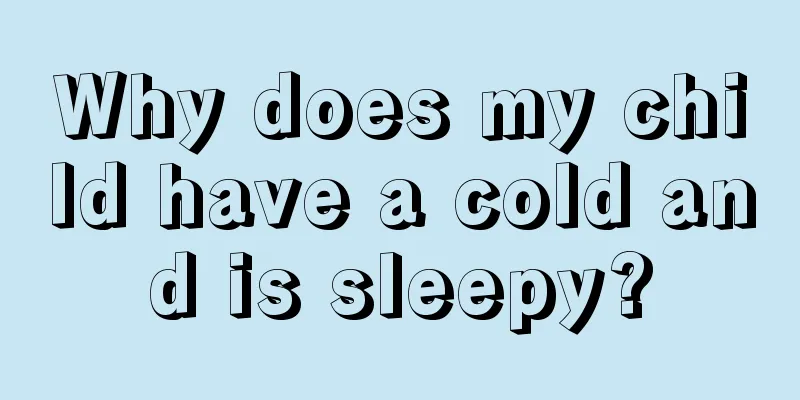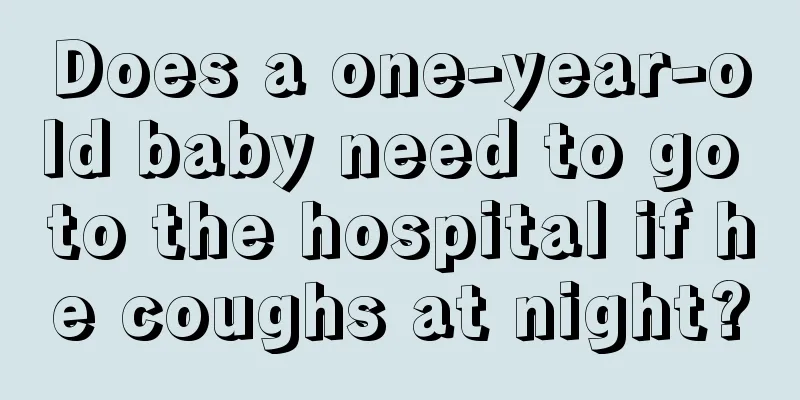Why does my child have a cold and is sleepy?

|
When people have a cold, they always feel sleepy and want to sleep every day. They almost recover after sleeping for a few days. In fact, colds are quite common in children. After the onset, they can cause very serious harm to the health of many children. Everyone should be vigilant about colds and carefully understand the symptoms of colds in children. When children have a cold, in addition to the common symptoms of a cold, what exactly is the cause of drowsiness? Will children with colds become sleepy? 1. Mild cases only have nasal symptoms, such as clear runny nose, nasal congestion, sneezing, etc. Tears, slight cough or throat discomfort may also occur. The symptoms can heal naturally within 3 to 4 days. If the infection involves the nasopharynx and pharynx, there are often fever, sore throat, tonsillitis, and congestion and hyperplasia of the lymphatic tissue on the posterior pharyngeal wall. Sometimes the lymph nodes may be slightly swollen. Fever can last from 2 to 3 days to about 1 week. It can easily cause vomiting and diarrhea in infants and young children. 2. In severe cases, the body temperature may reach 39-40℃ or higher, accompanied by a feeling of cold, headache, general weakness, a sharp loss of appetite, disturbed sleep, etc. Soon, the skin may turn slightly red, and herpes and ulcers may occur, which is called herpetic pharyngitis. Sometimes the redness and swelling are obvious, affecting the tonsils, follicular purulent exudate appears, sore throat and systemic symptoms are aggravated, and nasopharyngeal secretions change from thin to thick. The submandibular lymph nodes were significantly enlarged and tender. If the inflammation spreads to the sinuses, middle ear or trachea, other symptoms will occur and the systemic symptoms will also be more serious. Among the more serious symptoms, attention should be paid to high fever convulsions and acute abdominal pain, and differential diagnosis should be made from other diseases. After understanding the above knowledge, everyone should have some understanding of the symptoms of children's colds. Colds occur frequently and once they occur, they will cause serious harm to the health of the children. I hope that parents and friends can be vigilant about the occurrence of colds. They must correctly understand the symptoms of the disease and pay attention to preventing colds in daily life. How to treat cold and sleepiness If you feel sleepy when you have a cold, you need to get enough rest, get enough sleep, and drink plenty of water. A cold is a self-limiting disease. There is no specific antiviral drug for the cold virus, and the main treatment is symptomatic. If there is obvious nasal congestion, some drugs that can reduce nasal mucosal congestion can be used appropriately. If there is obvious fever and headache, you can use some acetaminophen or other non-steroidal anti-inflammatory drugs appropriately. If bacterial infection is combined, standardized antibiotic anti-infection treatment is required, mainly symptomatic treatment. The normal course of the disease is three to five days, and most of the time it will resolve on its own. During this process, you need to ensure adequate sleep, sufficient rest, and drink plenty of water. |
<<: Is it necessary to check for allergies in children?
>>: Do babies with jaundice love to sleep?
Recommend
What should I do if my child has dry nasal cavity?
If a child's nasal cavity is dry, the child w...
How to remove baby teeth?
When children reach a certain age, their deciduou...
Is pulmonary edema serious in children?
Water accumulation in the lungs is usually pulmon...
Two and a half year old baby education
Many mothers are more concerned about whether the...
How many months is it better to stop breastfeeding?
The baby's physical health is what parents ar...
What causes yellow teeth in children?
We all know that yellow teeth are caused by inade...
What to do if your baby likes to bite your nipple while feeding
I believe many mothers have had this experience: ...
What does it mean for children to have allergic constitution?
As we all know, allergies are a common problem in...
Black teeth on children's teeth?
Babies' teeth are generally very fragile. If ...
What to do if your child poops green
It is a common phenomenon for children to have gr...
What is the cause of red bloodshot eyes in newborns?
Red blood streaks are a common eye disease in lif...
Epilepsy symptoms in children
Epilepsy is a relatively common disease, also kno...
What should I do if my baby’s teeth come out late?
Many parents are worried that their children will...
35-month-old baby development indicators
The characteristics of a child's physical dev...
What are the treatments for nephrotic syndrome in children?
Kidney disease is a relatively serious disease. O...









